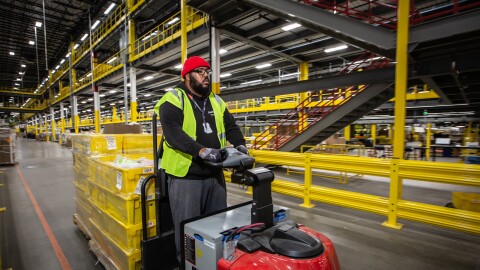The UK Government is currently considering reforms to how it regulates companies operating in our increasingly digital economy. We wanted to set out how Amazon approaches these issues, as we believe that good regulation supports open competition, investment and innovation. Good regulation also ensures that it is the customer who benefits.
Every business now has to think digital
The vast majority of businesses are increasingly thinking about their digital presence, and the retail sector is a great example. Like almost all major retailers in the UK, we sell both online and through physical stores. Our online sales are supported by one of the UK’s largest physical delivery networks, and our small but growing network of Amazon city centre locations enables customers to collect their orders, purchase goods in person, and return goods purchased online.
The UK’s retail sector is highly competitive and innovative, and most major retailers combine in-store and click and collect sales. The share of online sales for retailers is rising fast: John Lewis expects 60-70% of its sales to be made online by 2025, and Next expects to reach 71% as soon as next year. We spend a lot of time talking to our customers, and we know that they don’t consider their purchases to be digital or non-digital. They go where they can find the best price, convenience and choice. We think that the rules governing competition should focus on the outcomes that matter to consumers, not whether or not a sale is made in store, on a phone, or on a computer.
Limitless opportunity for innovation
Since arriving in the UK in 1998, our success has come as a result of innovation for our customers. We’ve grown from two people in a garage to over one million employees around the world, as a result of our pursuit of greater choice, better prices, and more convenience. Retail is a highly competitive and low margin sector, but our focus on those qualities that matter most to our customers has seen us constantly invest and innovate in order to give people more of what they want.
Our latest innovation to come to the UK is Amazon Fresh stores with Just Walk Out technology, with six locations now open in London. Customer experience breakthroughs like Just Walk Out take huge investment, a willingness to take risks, and a commitment to long-term thinking; all of which are in the DNA of a company like Amazon. We think we, and other successful businesses, should continue to be able to branch off in new directions and challenge the status quo when it improves value, choice and convenience for customers.
Tech startup ecosystems should be treasured
The UK’s startup scene is world-class, and some startups grow into international players. Others don’t: they choose to be acquired along the way by another company interested in their technology, employees or ideas. Entrepreneurs call such sales an ‘exit’.
The choice of an exit can be taken for many reasons: a startup’s founders may need access to a larger firm’s capabilities to achieve scale, they may have developed interesting technologies but not a viable business model, or they may simply have a new idea and want to explore that instead. Indeed, the UK has many ‘serial entrepreneurs’, such as Alex Chesterman, the founder of LoveFilm, which was acquired by Amazon, and who has gone on to found Zoopla and Cazoo; and Dana Tobak, the founder of internet service provider Be Unlimited, which was acquired before she went on to create fibre broadband company Hyperoptic. Amazon has invested in many startups in the UK over the years, from LoveFilm to IMDb. These exits can be transformative for the acquired business, helping to reach greater scale, innovate more quickly, and reach more customers globally than they could have done on their own.
We think it’s important for Amazon and other successful companies to be able to invest in UK startups, and it’s important that they have the freedom to sell to a buyer that’s right for them.
The UK’s world-class rules
The UK has a global reputation for being open to outside investment, and for having regulation that is fair and just. When changes to the rules that have created this environment are made, they should preserve and build on those strengths. That means rules should be evidence-based, not targeted at specific businesses, and have checks and balances to ensure their fair implementation.
We’ve been working hard to serve customers for over 20 years in the UK, and are proud of the significant economic contribution we are making to the UK economy. We’ve invested £32bn since 2010, we support more than 65,000 British small businesses selling on the Amazon Store which drove total export sales of more than £3.5bn last year, and we have more than 55,000 permanent employees across the UK. Looking ahead, we know that the UK remains full of opportunity and we continue to be excited by the potential to continue to invest, create jobs, support innovation, develop talent and have a positive impact in communities across the country.











